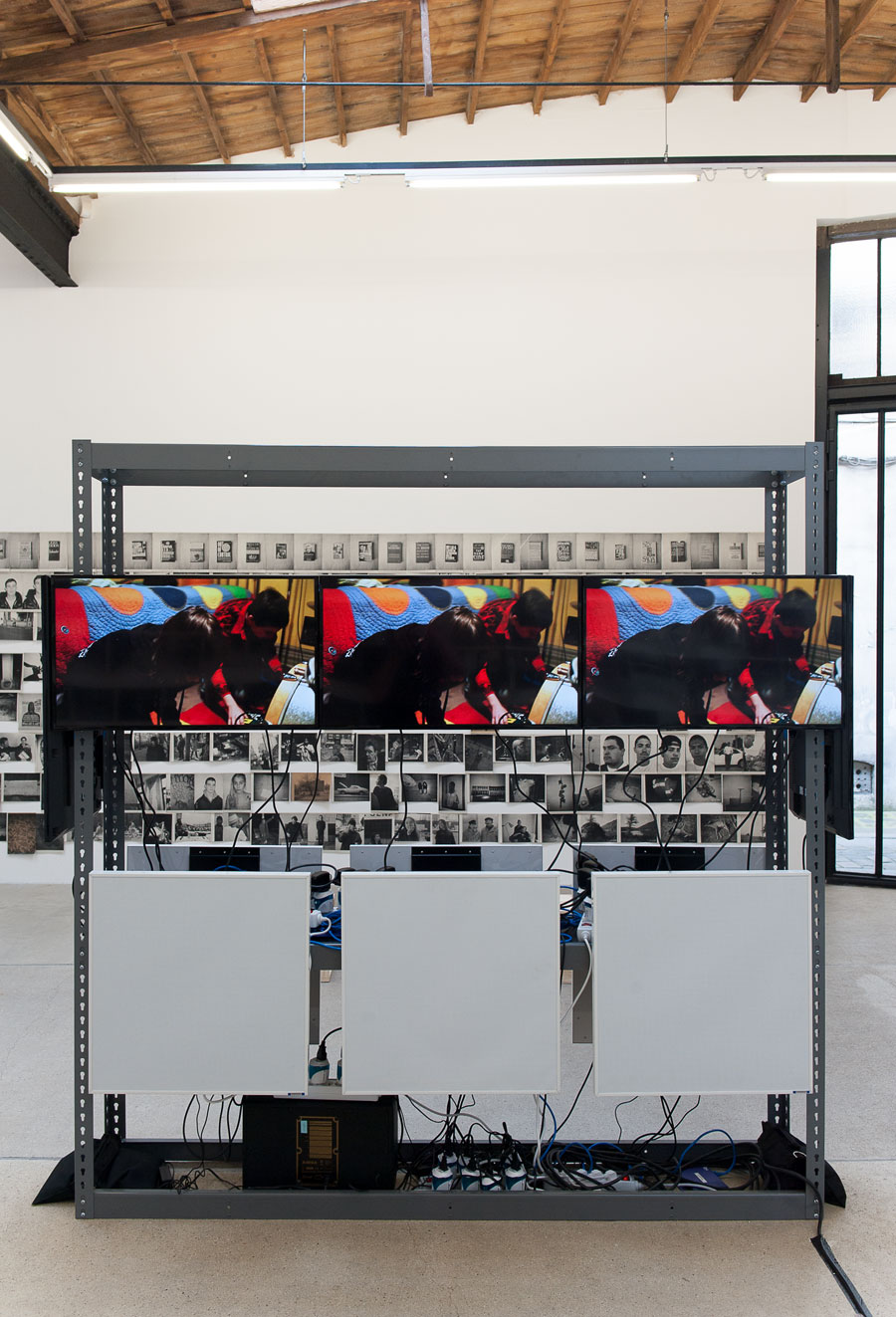Ari Marcopoulos
galerie frank elbaz, Paris, France
galerie frank elbaz, Paris, France

Right down at ground level is a black and white photograph of a magazine cover: The International Review of African American Art from 1998. Beneath the image of a mixed media assemblage by artist Betye Saar, the cover asks two questions: ‘Stereotypes subverted? Or for sale?’ These two questions inform much of the work of Ari Marcopoulos, a photographer known for depictions of so-called outsiders (skaters, snowboarders, club kids, transvestites) and for fashion shoots in magazines like Arena Homme Plus, Dazed & Confused and Vogue.
The photograph is one of approximately 970 that fill the first of the two spaces at galerie frank elbaz. Each has been photocopied on cheap newspaper, arranged tightly together in eight horizontal rows and attached to the wall by a pin in each top corner. Together this mass of black and white images, collectively titled ‘Machine’, draws from across Marcopoulos’s four decades as a photographer. Most of the works were shot in America, where Marcopoulos moved from Amsterdam in 1980. Nothing is labelled, so every image is equal to every other: portraits of famous friends and collaborators (Matthew Barney, Jean-Michel Basquiat, Pierre Huyghe, Jay-Z) are found among typical Marcopoulos subjects: skaters beneath a flyover, topless boys, handsome young men in checked shirts and graffiti-covered garage doors. ‘Smash the state’, reads one, followed by an anarchy symbol.

The photographs don’t seem to be in any particular order. Some series remain together; others have been broken up and recur around the room. Some images combine in filmic fashion: in particular, a series of eight photographs of a man in black shorts twirling a makeshift baton within a vast concrete canal bed. Marcopoulos’s partner, the artist Kara Walker, features repeatedly. Fragments of narrative begin to emerge but are broken just as swiftly.
Around all four walls the top row shows photographs of book covers. They are mostly conspiracy-tinged works about the C.I.A or the assassination of John F. Kennedy or the threat of communism. There are five titles by Peter Dale Scott, a poet and academic known for his analysis of the American ‘deep state’, a conglomeration of powerful public and private sector interests that the US alt-right now believe Donald Trump will somehow save them from. This comparatively recent series – most of the photos are date-marked 2012 – casts a strange pall.
In the centre of the room stands an eight-screen installation Machine (2017) that plays randomized short films, also drawn from across Marcopoulos’s career. There is footage of a car repair garage, two young kids making music in their bedroom, Trump dancing with Ivanka. Six speakers blare out feedback and overlapping layers from the different films. A snaking mass of wires connects the various elements. Like the display of photographs, the effect is oh so raw.

In the second gallery is the exhibition’s most successful work: The Park (2017), a 58-minute silent film shot at a public basketball court in Brooklyn, New York. Some of Marcopoulos’ best photography is characterized by an openness to individual personalities, often within a group setting. But the sheer mass of photographs in the first gallery muddies their power. If the artist is making a point about the relationship between images, media, politics and power, it is not an especially interesting one. The Park sees a welcome return to simplicity. The film was shot in two cuts: 51 minutes from one end of the court; seven from the other. Marcopoulos says it is one of the few courts in New York with no fence around it. People walk past or stop to chat with the players. It is a casual, open, space. If there are boundaries they are social rather than physical: as in much of Marcopoulos’s work, this is a male-dominated space. In a 2009 interview Marcopoulos spoke about his ‘kinship with anthropology’ and this is certainly a subtle, fascinating study of changing rhythms of play – now casual, now tightening with competition – and the subtle interactions between friends and strangers.
Main image: Ari Marcopoulos, Machine (detail), 2017, installation view, galerie frank elbaz, Paris. Courtesy: the artist and galerie frank elbaz, Paris; photograph: Raphael Fanelli
























